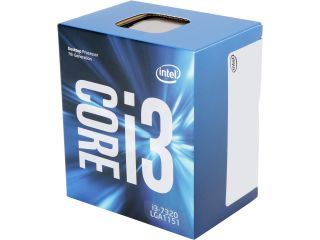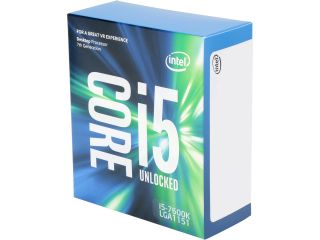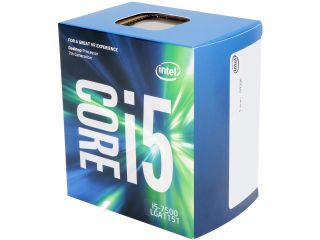Intel Core i3-7350K Review
Why you can trust Tom's Hardware
Gaming Benchmarks
Game Testing Particulars
Enthusiasts who shell out enough money for a Titan X aren't going to have an overclocked dual-core CPU under the hood. In an effort to balance the host processors we're testing with graphics horsepower, we're complementing them with a mid-range Asus Strix RX 470 4GB. We're also benchmarking at the 1920x1080 resolution most mainstream gamers will aim for in this price range.
Comparison Processors



3DMark Time Spy & Fire Strike


The graphics score for each host processor is a relatively even 3500 points due to limited GPU horsepower. But we observed linear CPU scaling based on core count (except for the dual-module Athlon X4 750K). The overclocked Core i3-7350K gained 442 points over its stock performance, demonstrating that frequency plays an important role as well. Intel's Pentium G4620 almost matched the Core i3-6320, while the Pentium G3258 fell to the bottom of the chart. Clearly, Hyper-Threading is a big deal when it comes to gaming.
Surprisingly, the overclocked Core i3-7350K capitalized on its frequency advantage to beat the Core i5-7500 and -7400, while the stock -7350K landed underneath both quad-core contenders. Though we see plenty of scaling, the overclocked Core i3-7350K's win suggests that DirectX 11 doesn't take full advantage of four physical cores as well as we might expect.
Ashes of the Singularity
Our entire test pool falls below Oxide Games' official minimum spec of a Core i7 or equivalent. Obviously, our results show that Ashes of the Singularity runs on dual-core CPUs; it's just not smooth. Even with a mainstream Radeon RX 470 installed, host processing is clearly the bottleneck, given solid scaling from the underpowered Athlon X4 750K and Pentium G3258 up to the beefy Core i5-7600K.










The Core i5-7600K leads during this test, and Intel's Core i5-7500 and -7400 aren't far behind. The Core i3-7350K offers more performance than a Pentium G4620, as expected, but it's noteworthy that the G4620 delivers great performance for its price. The Core i3-6320 comes close to the -7350K being reviewed, but suffers lower average and minimum frame rates. Overclocked to 4.9 GHz, we see Intel's Core i3-7350K pick up steam. While it's able to beat a Core i5-7400, this game definitely favors more physical cores. Interestingly, the overclocked Core i3 also enjoys less frame time variance and unevenness, yielding a smoother experience.
Terrible frame time results from the Pentium G3258 and Athlon X4 750K necessitate removing them from the chart. They muddy the outcome, so we're creating two sets of line graphs when it helps clarify our presentation.
We don't appear limited by our GPU, so it's probable we'd see even better performance by pairing the Radeon RX 470 with a faster host processor.
Battlefield 4
The Core i5-7400, Pentium G4620, and overclocked Core i3-7350K all return the same FPS results, though the Core i3 appears to encounter more frame time outliers and frequent frame rate dips.










It's fair to say that even the Pentium G3258 and Athlon X4 750K can run this game alongside a Radeon RX 470, particularly if you relax Battlefield's quality settings. It'd likely take a far more powerful graphics card to expose CPU-imposed performance limitations.
Hitman (2016)
The Core i3-7350K and -6320 run neck and neck during the benchmark, and thus end up with similar minimum and average frame rates. Adding more frequency to the -7350K yields an average of 5 FPS extra, raising the frame rate floor to 44.0.
The Core i3-6320 takes the edge in performance consistency, though, as we recorded slightly higher variance measurements from the stock -7350K. Overclocking helped smooth out those wrinkles, at least.
Swapping over to a Core i5-7600K yields a substantially higher frame rate than the stock Core i3-7350K, while the i5-7400 garners a 12% advantage.












The Core i5s scale linearly based on clock rate, and once again, the Pentium G3258 and Athlon X4 750K fall prey to severe stuttering issues. For context, a stock Core i3-7350K provides an almost 3x minimum frame rate advantage over the unlocked Pentium. Hitman lists a quad-core Core i5-2500K or Phenom II X4 940 as its minimum requirement, so while the low performance we see from the G3258 and X4 750 isn't shocking, we're more surprised by the Pentium G4620's solid outcome. It's surprisingly good thanks to Intel's addition of Hyper-Threading.
Meanwhile, the Core i5-7600K proves that games optimized for more host processing resources make stepping up worth considering.
Grand Theft Auto V
It looks like we are flirting with a graphics bottleneck, as the Core i5s deliver a similar experience during the first part of our benchmark. The workload becomes more CPU-intensive as we pass the test's halfway point, and scaling once again becomes apparent. The Pentium G3258 and Athlon X4 750K appear to provide almost-playable frame rates, but a quick glance at the frame time variance results suggest otherwise.
Meanwhile, a stock Core i3-7350K ekes out a 13% average frame rate advantage over the -6320, while Intel's Core i5-7400 solidifies itself as a contender by beating the Core i3-7350K in both average and minimum frame rates. It also serves up more consistency throughout the test.










The Pentium G4620 falls into step behind the two Core i3 CPUs, providing impressive frame rates. But it also begins to crumble under the benchmark's weight, exhibiting disturbing variance. All three dual-core models suffer more unevenness during the test than the quad-core Core i5s. Still, the Core i3-7350K fares better than the other dual-core chips.
AMD's Athlon X4 750K has lost its potency and is clearly reaching the end of its effective life for most DX11 games.
Project CARS
The Core i5s clump together at some points during the test, but we notice more stratification as the physics engine increases CPU load. It's important to note the developer recommends a minimum of a Core 2 Quad Q8400 or AMD Phenom II X4 940 for an optimal experience.










The Core i5-7600K reigns supreme, averaging 63.9 FPS, while everything else falls in line behind it. Even at our overclocked settings, the Core i3-7350K can't overtake the Core i5-7400, though the boost in frequency does facilitate a quantifiable performance gain.
The three Core i5s provide solid frame time variance measurements, while the Core i3 processors are subject to wider swings from one frame to the next. The Pentiums and Athlon suffer most. On the contrary, Intel's Pentium G4620 continues to impress, achieving a minimum of 30 FPS.
Metro: Last Light Redux
The Hyper-Threaded Pentium G4620 beats a stock Core i3-7350K, but it's close. The difference is a scant .2 FPS on average. Overclocking helps propel the Core i3-7350K into a slight lead, at 74.5 FPS. Inexplicably, the Core i5-7400 encounters severe frame time variance issues.
The Core i3-6320 delivers more performance than every stock CPU except the Core i5-7500, but maintain a bit of perspective. After all, the delta between the top five processors is only 0.7 FPS. This game is graphics-bound at the top of our range.










The Pentium G3258 and Athlon X4 750K deliver the performance we expect, which is to say underwhelming and prone to stuttering. Metro: Last Light Redux players will benefit more from a faster GPU, but you still want a quad-threaded CPU at fairly high clock rates, if possible.
Middle-earth: Shadow of Mordor
The entire Intel line-up provides enough performance to push us into graphics-bound territory, so we see little difference in average and minimum frame rates.









AMD's Athlon X4 750 lags the rest of the field, but musters an average of 87.8 FPS. It also registers the lowest minimum frame rate. The Pentium G3258 enables a solid 104.8 FPS, but also experiences more variance than the other configurations.
Current page: Gaming Benchmarks
Prev Page The Unlocked i3 Cometh Next Page Office & Productivity ApplicationsStay on the Cutting Edge
Join the experts who read Tom's Hardware for the inside track on enthusiast PC tech news — and have for over 25 years. We'll send breaking news and in-depth reviews of CPUs, GPUs, AI, maker hardware and more straight to your inbox.

Paul Alcorn is the Managing Editor: News and Emerging Tech for Tom's Hardware US. He also writes news and reviews on CPUs, storage, and enterprise hardware.

ASML ships its second High-NA EUV litho tool to unspecified client

US sanctions transform China into legacy chip production juggernaut — production jumped 40% in Q1 2024

Alleged cryptojacker arrested for money laundering, $3.5 million in cloud service fraud — ultimately mined less than $1 million in crypto
-
Justiceinacan As someone who just enjoys overclocking and was coming from an FX chip, it is nice but I agree with the rest of the article ; a locked i5 is a very solid chip for similar pricing to the unlocked i3 which may fare better or worse.Reply -
Sakkura It simply needs to drop $20. I suspect they may have launched this chip, and the hyperthreaded Pentiums, as a precaution for Ryzen. Intel doesn't usually adjust pricing, but I would not be the least bit surprised if the 7350K becomes an exception after the Ryzen launch (assuming things go well for AMD).Reply -
ubercake These processors are $159 at microcenter. That's the $20 price drop Sakkura is looking for! I think I'd still just fork over the additional $40 (again microcenter) for the i5 though.Reply -
InvalidError Given how expensive the top-end i3 has become and the extra expenses that go in actually leveraging its overclockability, I'd say that the i5-7400 with a h270 motherboard would be the better bang-per-buck option in most cases. At least until Ryzen comes along 2-3 weeks from now and redefines what good bang-per-buck is.Reply -
ubercake I really hope Ryzen lives up to the hype. I can't wait to see the R7 1800X vs. i7-6900K reviews.Reply -
Ashwaganda With 168$ MSRP this cpu just isnt attractive, considering i5-7400 182$ MSRP.Reply
Even if you could overclock it with cheaper H110/B150/B250 board, the i5-7400 is a better buy. Also the 63$ Pentium G4560 utterly destroys i3-7350K by value.
Sure G4560 does not have AVX instructions, but who cares. For gaming and everyday use purposes AVX doesnt offer any real benefit. -
bak0n The only reason I'd pick up this would be for playing games like Sins of a Solar empire that don't make use of enough cores and loads the screen with lots of processing at end game.Reply -
logainofhades These are selling for $180 right now. Simply not worth it. At least the pentium G3258 was priced close to its locked siblings. The price needs to drop, significantly. At current prices, and with the hyperthreaded Pentiums, the i3 is kinda irrelevant right now. Wonder if Intel knows something about Ryzen, that we don't, because these recent moves don't make a lot of sense.Reply -
why_wolf I really get the feeling this chip is being setup so Intel can drop the price on it if AMD eats to much of the low end market. As it stands right now, at this price point, I'd have to agree going to an i5 instead makes way more sense for the majority of users out there.Reply -
Math Geek the G4620 stands out more in this review to me than this i3 does. at ~$90 it is a much better buy than this i3 for a true budget build. once it's price drops in response to AMD, then it will be worth a revisit once we know what AMD has to offer. but for now, i won't be recommending this cpu to anyone. locked i5 much better bang for the buck with the locked i3 or this new HT Pentium for a budget build.Reply